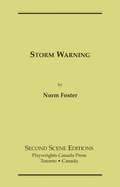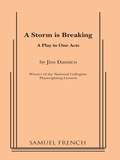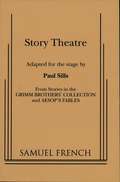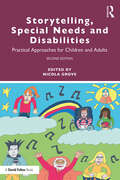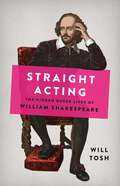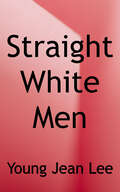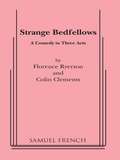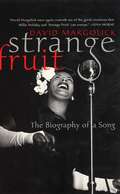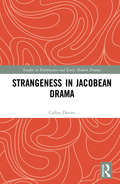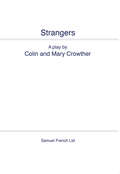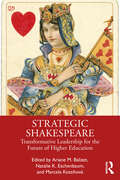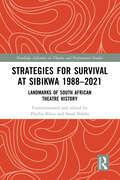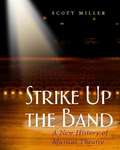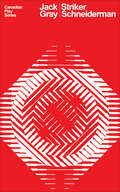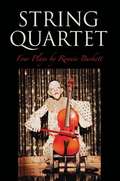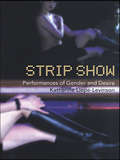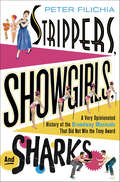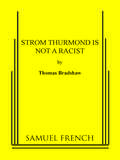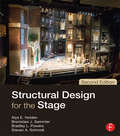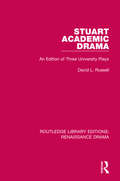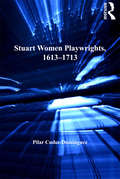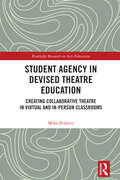- Table View
- List View
Storm Warning
by Norm FosterSet in cottage country in 1953, Jack Forrester, a damaged World War II vet, has retreated from life. Then one weekend he meets Emma Currie, an amphetamine-popping chart writer for a big band. Both lives will change forever as these two opposites collide.
Storm is Breaking
by Jim DamicoComedy / 1 m., 1 f. (off stage), 1 boy / Ext. / Winner of the first National Collegiate Playwriting Contest, this is a portrait of a boy who has been following an ant along the sidewalk for several hours. It is a picture that is hard to put out of your mind, and its intimations leave lasting thoughts. The boy prevents a man from stepping on the bug-- insect, the boy corrects him. For to the boy, everything on earth has size and significance.
Story Theatre
by Paul SillsFables / 5m, 3f / Stage, projections / Mr. Sills started in New Haven, journeyed to the Mark Taper Forum in Los Angeles, and wound up on Broadway with this group of famous fables from the Grimm Brothers and Aesop. Here you will meet again Henny Penny, the Golden Goose, Venus and the Cat, the Fisherman and His Wife, The Robber Baron, the Bremen Towson Musicians, and other favorites. The fables require talented actors with expressive bodies. And make no mistakes about the quality: this is top drawer adult theatre.
Storytelling in Participatory Arts with Young People: The Gaps in the Story (Palgrave Studies In Play, Performance, Learning, and Development)
by Catherine HeinemeyerThis book draws on the author’s experience as a storyteller, drama practitioner and researcher, to articulate an emerging dialogic approach to storytelling in participatory arts, educational, mental health, youth theatre, and youth work contexts. It argues that oral storytelling offers a rich and much-needed channel for intergenerational dialogue with young people.The book keeps theory firmly tethered to practice. Section 1, ‘Storyknowing’, traces the history of oral storytelling practice with adolescents across diverse contexts, and brings into clear focus the particular nature of the storytelling exchange and narrative knowledge. Section 2, ‘Telling Stories’, introduces readers to some of the key challenges and possibilities of dialogic storytelling by reflecting on stories from the author’s own arts-based practice research with adolescents, illustrating these with young people’s artistic responses to stories. Finally, section 3, ‘Story Gaps’, conceptualises dialogic storytelling by exploring three different ‘gaps’: the gap between storyteller and listener, the gaps in the story, and the gaps which storytellers can open up within institutions. The book includes chapters taking a special focus on storytelling in schools and in mental health settings, as well as guided reflections for readers to relate the issues raised to their own practice.
Storytelling, Special Needs and Disabilities: Practical Approaches for Children and Adults
by Nicola GroveNow in a fully revised and updated second edition, this innovative and wide-ranging book shows how storytelling can open new worlds for individuals with special educational needs and disabilities. Providing a highly accessible combination of theory and practice, the contributors to this book define their own approaches to inclusive storytelling, describing the principles and theory that underpin their practice, whilst never losing sight of the joy at the heart of their work. Topics include therapeutic storytelling; language and communication; interactive and multi-sensory storytelling; and technology. Each chapter includes top tips, and signposts further training for practitioners who want to start using stories in their own work, making this book a crucial and comprehensive guide to storytelling practice with diverse learners. This new edition: · has been fully updated to reflect the way in which this field of storytelling has grown and developed · uses a broad range of chapters, structured in a way that guides the reader through the conceptualisation of a storytelling approach towards its practical application · includes an additional chapter, sharing the lived experiences of storytellers who identify as having a disability. Full of inspiring ideas to be used with people of all ages and with a range of needs, this book will be an invaluable tool for education professionals, as well as therapists, youth workers, counsellors and theatre practitioners working in special education.
Straight Acting: The Hidden Queer Lives of William Shakespeare
by Will ToshA dazzling and "highly readable" (Guardian) portrait of Shakespeare as a young artist, revealing how his rich and complex queer life informed the plays and poems we treasure today &“Was Shakespeare gay?&” For years the question has sent experts and fans into a tailspin of confusion. But as scholar Will Tosh argues, this debate misses the point: sex, intimacy, and identity in Elizabethan England were infinitely more complex—and queer—than we have been taught. In this incisive biography, Tosh reveals William Shakespeare as a queer artist who drew on his society&’s nuanced understanding of gender and sexuality to create some of English literature&’s richest works. During Shakespeare&’s time, same-sex desire was repressed and punished by the Church and state, but it was also articulated and sustained by institutions across England. Moving through the queer spaces of Shakespeare&’s life—his Stratford schoolroom, smoky London taverns and playhouses, the royal court—Tosh shows how strongly Shakespeare&’s early work was influenced by the queer culture of the time, much of it totally integrated into mainstream society. He also uncovers the surprising reason why Shakespeare veered away from his early work&’s gender-bending homoeroticism. Offering a subversive sketch of Elizabethan England, Straight Acting uncovers Shakespeare as one of history&’s great queer artists and completely reshapes the way we understand his life and times.
Straight White Men: Untitled Feminist Show
by Young Jean LeeTwo plays by the award-winning dramatist, the first Asian-American female playwright to be produced on Broadway. <p><p>In Straight White Men, it's Christmas Eve, and Ed has gathered his three adult sons to celebrate with matching pajamas, trash-talking, and Chinese takeout. But when a question they can't answer interrupts their holiday cheer, they are forced to confront their own identities. <p><p>In Untitled Feminist Show, six charismatic stars of the downtown theatre, dance, cabaret, and burlesque worlds come together to invite the audience on an exhilaratingly irreverent, nearly-wordless celebration of a fluid and limitless sense of identity.
Strange Bedfellows
by Florence RyersonComedy \ 7 m., 11 f. \ Int. \ Senator Cromwell, an old line politician who keeps his women under stern rule, has a new daughter in law. When he learns Matthew's bride is a feminist leader campaigning for the Women's Rights Bill due to come up in the same election Matthew is running in for re election to Congress, there is an explosion which shakes the family and threatens Matthew's marriage. \ "If you're looking for laughs, don't miss Strange Bedfellows ." N.Y. Mirror
Strange Fruit: The Biography Of A Song
by David MargolickRecorded by jazz legend Billie Holiday in 1939, "Strange Fruit" is considered to be the first significant song of the civil rights movement and the first direct musical assault upon racial lynchings in the South. Originally sung in New York's Cafe Society, these revolutionary lyrics take on a life of their own in this revealing account of the song and the struggle it personified. Strange Fruit not only chronicles the civil rights movement from the '30s on, it examines the lives of the beleaguered Billie Holiday and Abel Meeropol, the white Jewish schoolteacher and communist sympathizer who wrote the song that would have an impact on generations of fans, black and white, unknown and famous, including performers Lena Horne, Eartha Kitt, and Sting.
Strangeness in Jacobean Drama (Studies in Performance and Early Modern Drama)
by Callan DaviesCallan Davies presents “strangeness” as a fresh critical paradigm for understanding the construction and performance of Jacobean drama—one that would have been deeply familiar to its playwrights and early audiences. This study brings together cultural analysis, philosophical enquiry, and the history of staged special effects to examine how preoccupation with the strange unites the verbal, visual, and philosophical elements of performance in works by Marston, Shakespeare, Middleton, Dekker, Heywood, and Beaumont and Fletcher. Strangeness in Jacobean Drama therefore offers an alternative model for understanding this important period of English dramatic history that moves beyond categories such as “Shakespeare’s late plays,” “tragicomedy,” or the home of cynical and bloodthirsty tragedies. This book will be of great interest to students and scholars of early modern drama and philosophy, rhetorical studies, and the history of science and technology.
Strangers: A Play
by Colin Crowther Mary CrowtherThey may be mother and daughter yet they are strangers to each other, still refusing to face what really happened that day. No wonder they cannot move on with their lives. It takes another stranger, Cassiel, a passing fisherman to help them disentangle the weeds that are drowning them. But Cassiel is more than he appears...A hauntingly beautiful, many-layered tale of love and forgiveness, played out on an abandoned jetty.
Strategic Shakespeare: Transformative Leadership for the Future of Higher Education
by Marcela Kostihová Natalie K. Eschenbaum Ariane M. BalizetStrategic Shakespeare demonstrates the value of humanities-trained scholars as leaders in higher education. It features contributions from Renaissance and Shakespearean scholars in leadership roles in North American higher education, who collectively aim to leverage traditional assumptions about Shakespeare in the service of a more inclusive and sustainable academy.Making a powerful case for the liberal arts, the contributors demonstrate ways in which training in the humanities creates a baseline of skills in collaboration, deep listening, tolerance for ambiguity, and a range of positionalities. They also illustrate an astute understanding of disparate data sets, persuasive storytelling, and a commitment to liberal arts education. As this innovative collection showcases, these skills are crucial in the current climate, as higher education struggles with declining enrolments, decreasing budgets, growing public distrust, and (often) hostile legislative oversight. Additionally, the skills help us navigate a rapidly shifting landscape of learning in the aftermath of the COVID-19 pandemic and entry of generative artificial intelligence (AI) to the public sphere. The collection presents theoretical arguments, case studies, personal narratives, and practical advice related to how humanities-trained scholars have led and must continue to lead the academy through transformative change.Strategic Shakespeare is an essential tool for anyone interested in learning from university leaders who have made good things happen on their campuses, in their communities, and in the profession. It celebrates and foregrounds the core adaptive skills that humanities scholars bring to the table, showcasing their unique predisposition for successful academic leadership during a time of unprecedented change.
Strategies for Survival at SIBIKWA 1988 – 2021: Landmarks of South African Theatre History (Routledge Advances in Theatre & Performance Studies)
by Phyllis Klotz Smal NdabaThis book provides an engaging and contextualised insight into a South African township-based arts centre that has survived the vicissitudes of steady militarisation in townships during some of the worst years of apartheid as well as the exhilaration of a new democratic policy while attempting to circumnavigate different policies and funding dispensations. Sibikwa provides arts centres across the world and especially those in decolonising countries with strategies for survival in tumultuous times. This multi-disciplinary book maps and co-ordinates wider historical, political, and social contextual concerns and events with matters specific to a community-based east of Johannesburg and provides an exploration and analysis by experts of authentic theatre-making and performance, dance, indigenous music, arts in education and NGO governance. It has contemporary significance and raises important questions regarding inclusivity and transformation, the function and future of arts centres, community-based applied arts practices, creativity, and international partnerships. This study will be of great interest to students and scholars in theatre and performance, indigenous music, dance, and South African history.
Street Soldiers (Drama High #15)
by L. DivineStressed out by strange visions and insomnia, Jayd finds herself back at Mama's house. Mama's convinced that something sinister is at play. But can they come up with a plan to get Jayd's swagger back? [Proofreader's Note: Many errors in the original text, both grammar and spelling. Errors left as is following copyright laws.]
Strike Up The Band: A New History Of Musical Theatre
by Scott MillerThe way some histories portray the advent of musicals, you'd think the genre emerged fully formed with Show Boat. Yet in truth, it took root decades earlier. In Strike Up the Band Scott Miller tells the whole story of musicals, pulling back the curtain on the amazing innovation and adventurousness of the art form, revealing its political and social conscience, and chronicling its incredibly rapid evolution over the last century. Strike Up the Band focuses not only on what happened on stage but also on how it happened and why it matters to us today. It's a different kind of history that explores the famous and, especially, the not-so famous productions to discover the lineage that paved the way to contemporary musicals. Digging into 150 shows, Miller offers a forward-looking perspective on treasures from each era - such as Anything Goes, West Side Story, Hair, and Rent - while also looking at fascinating, genre-busting, and often short-lived productions, including Bat Boy, Rocky Horror Show, Promenade, and The Capeman, to see how even obscure or commercially unsuccessful musicals defined and advanced the form. Moving decade by decade, Miller offers insight and inside information about the artistic approaches various composers, lyricists, bookwriters, and directors have taken, how those approaches have changed over time, and what social and historical forces continue to shape musical theatre today. He provides a strong sense of what groups have historically controlled the industry and how other groups' hard work and vision continue to change the musical theatre landscape for the better. In fact, Strike Up the Band opens a new and vitally important discussion of the roles played in the musical's history by people of color, by gays and lesbians, by people with disabilities, and by women. It frames musical theatre as an important, irreplaceable piece of American history and demonstrates how it reflects the social and political conditions of its time - and how it changes them. On Broadway or off, Strike Up the Band is as adventuresome, detailed, and thoughtful in tracing the story behind the musical as it is in celebrating the form's diversity, vigor, innovation, and promise. Join Scott Miller not only in commemorating great moments on stage, but in gaining a powerful understanding of what the musical was, what it is today, and what it is becoming.
Striker Schneiderman
by Jack GrayA comedy set in Winnipeg during the 1919 General Strike, Striker Schneiderman was first presented in 1970 at the St. Lawrence Centre for the Arts in Toronto. Its protagonist, Moische Schneiderman, is a tailor whose possessions include a small business, a large mortgage, a devoted wife, three beautiful daughters, and a sense of the ridiculous. Moische also believes passionately in law, order, good government, peace, friendship and being left alone. It is partly because of these passions that he, against his better judgment, becomes involved as a go-between for his clientele, the establishment, his friends, and the left-wing labour movement during the General Strike.
String Quartet: Four Plays by Ronnie Burkett
by Ronnie BurkettA collection of four plays by internationally renowned puppeteer Ronnie Burkett. This anthology includes the three plays of the Memory Dress Trilogy: Tinka's New Dress, Street of Blood, and Happy, as well as Provenance. Tinka's New Dress Two old friends become puppeteers, each performing with the same beloved folk characters, Franz and Schnitzel. Fipsi, ambitious and naive, aligns herself with the rule government, the Common Good. Carl, headstrong and outspoken, is forced underground as his satirical shows parody the censorship and oppression of the Common Good. Based on the illegal puppet shows staged in Nazi-occupied Czechoslovakia, Tinka's New Dress examines propaganda versus truth, compliance versus censorship, and the collective society versus the individual. Street of Blood When Mrs. Edna Rural pricks her finger and bleeds onto her sewing he sees the face of Christ in a quilt square. As the media and the faithful converge on her sleepy prairie town, a has-been Hollywood vampire seeking rejuvenation and a karaoke-singing gay terrorist intent on revenge join the fray. And just as the bloodbath begins, the man in the quilt appears in the flesh to the odd trio, revealing that the bonds of blood are thicker and stranger than their individual thirsts led them to believe. Happy Happy, a cheerful veteran, homespun philosopher, and pensioner, wanders through episodes of grief in the lives of his fellow rooming-house tenants. Alongside Happy is Antoine Marionette, the emcee of the Grey Cabaret, who introduces arch presentations of sadness in song, pantomime, and burlesque that mirror and parody the stages of grief experienced by each character. Provenance Pity Beane, a young art academic, travels to Europe to trace the provenance of the subject of her obsession, a painting of a young man known simply as Tender. What she finds is so much more than she had ever imagined. In a broth run by an aging madam, the twentieth-century art scene is played out from Paris, London, and Vienna in an unrivalled exploration of beauty: our obsession with it, our fantasies about it, our addiction to it, and our ownership of it.
Strip Show: Performances of Gender and Desire (Gender in Performance)
by Katherine Liepe-LevinsonThis book offers an account of an unprecedented North American study of contemporary female and male strip shows. It particularly focuses on the contradictory sex roles, cultural positions, and performance practices of 'straight' strip shows during their second heyday in the early 1990s.Katherine Liepe-Levinson's research took her to over seventy different strip bars, clubs, theatres and sex emporiums ranging from elaborate lap-dancing and couch-dancing 'gentlemen's' clubs in New York, Houston, and San Francisco; to Peoria's onetime duplex cabaret where women strip for men downstairs, and men for women upstairs; to the nightclubs of Montreal where female and male performers displayed the 'Full Monty'. Liepe-Levinson's intriguing, comprehensive study concentrates on the cultural and theatrical elements of the strip shows themselves including the geographic locations and interior designs of the clubs, the choreography and costumes of the dancers and the all-important participation of the audience. She draws upon a variety of methodologies as well as interviews with performers to explore how the strip show's cultural and theatrical aspects simultaneously uphold and break traditional sex roles. Her findings readily complicate several of the most prominent and prevalent theories about sexual representation, gender and desire.
Strippers, Showgirls, and Sharks: A Very Opinionated History of the Broadway Musicals That Did Not Win the Tony Award
by Peter Filichia"Wait..Gypsy didn't win the Tony for Best Musical?"That's a question that gets asked over and over again, every time a new Rose takes to the runway in the Broadway classic "Gypsy". In "Strippers, Showgirls and Sharks", the popular syndicated theatre critic Peter Filichia chronicles the history of the American musical by looking at those shows that did not win the Tony Award for Best Musical. It happens every spring: The American Theatre Wing bestows its annual awards. Only those shows that have reached Broadway are nominated and while all Tony Awards are created equal in height, width and depth, the universally acknowledged biggest prize is the Best Musical Tony. The envelope is opened. The winner is announced and, then, the screeching begins. "Oh no! They gave it to that?" Did the best musical always win the Best Musical prize? Were there other factors that kept a more deserving show from copping the prize? Peter Filichia answers all these questions and more in "Strippers, Showgirls and Sharks" as he looks at many of the 153 previous Best Musical Nominees that didn't win the big prize. What were the biggest omissions? "Gypsy" had the distinct displeasure of not being either the first or second choice of the committee. In 1959 when Ethel Merman and a variety of strippers took the stage, the Tony for Best Musical was a tie between "The Sound of Music" and "Fiorello". In 1971, Stephen Sondheim's "Follies" and its ghostly showgirls lost to a "groovy" re-tuning of "Two Gentlemen of Verona" that hasn't passed the test of time. And, in 1957, "West Side Story", its Jets and Sharks, were bested by the fine people of River City Iowa singing their Americana hearts out in "The Music Man". If you love Broadway, scratch your head on Tony Award night and still can't figure out how a show you loathed won the Tony for Best Musical, you will love riding through the years with Peter Filichia, one of America's most respected and popular theatre critics.
Strom Thurmond Is Not A Racist
by Thomas BradshawSatire / 5m, 2f (doubling, flexible casting possible) / Modular sets / Inspired by a true story, Strom Thurmond is Not a Racist is an absurdist look at the life of Senator Strom Thurmond. After fathering a child with his black maid as a young man, the extremely white Strom Thurmond became one of the country's greatest segregationists; all the while playing daddy to his bi-racial daughter Essie Mae Washington Williams. How could someone live such a duplicitous life? It happens. Winner of The American Theater Coop's National Playwriting Contest in 2005. Published with CLEANSED. / "Tom Bradshaw's most important contribution to society is snatching narrative and its elements back from the clutches of the ordinary" -- Richard Maxwell, Playwright and Director
Structural Design for the Stage
by Alys Holden Bronislaw Sammler Bradley L Powers Steven A SchmidtThe follow-up to the 2000 Golden Pen Award-winning Structural Design for the Stage, this second edition provides the theater technician with a foundation in structural design, allowing an intuitive understanding of "why sets stand up." It introduces the basics of statics and the study of the strength of materials as they apply to typical scenery, emphasizing conservative approaches to real world examples. This is an invaluable reference for any serious theatre technician throughout their career, from the initial study of the fundamental concepts, to the day-to-day use of the techniques and reference materials. Now in hardcover, with nearly 200 new pages of content, it has been completely revised and updated to reflect the latest recommended practices of the lumber and steel industries, while also including aluminum design for the first time.
Stuart Academic Drama: An Edition of Three University Plays (Routledge Library Editions: Renaissance Drama)
by David L. RussellAlthough not much is known about the three Stuart plays in this edition, which was first published in 1987, we can ascribe them to one of the English universities, and each is indicative of a distinctly different influence on the Renaissance academic drama. Heteroclitanomalonomia is part of a minor subgenre referred to as the academic play. It demonstrates the predominance of language or rhetoric studies in the period and its very subject is of purely academic interest. Gigantomachia displays the continuing interest of the Renaissance in classical mythology. And A Christmas Messe follows a more homely tradition, a farcical personification of the mundane. This title will be of interest to students of English Literature, Drama and Performance.
Stuart Women Playwrights, 1613–1713
by Pilar Cuder-DominguezIn the field of seventeenth-century English drama, women participated not only as spectators or readers, but more and more as patronesses, as playwrights, and later on as actresses and even as managers. This study examines English women writers' tragedies and tragicomedies in the seventeenth century, specifically between 1613 and 1713, which represent the publication dates of the first original tragedy (Elizabeth Cary's The Tragedy of Mariam) and the last one (Anne Finch's Aristomenes) written by a Stuart woman playwright. Through this one-hundred year period, major changes in dramatic form and ideology are traced in women's tragedies and tragicomedies. In examining the whole of the century from a gender perspective, this project breaks away from conventional approaches to the subject, which tend to establish an unbridgeable gap between the early Stuart period and the Restoration. All in all, this study represents a major overhaul of current theories of the evolution of English drama as well as offering an unprecedented reconstruction of the genealogy of seventeenth-century English women playwrights.
Student Agency in Devised Theatre Education: Creating Collaborative Theatre in Virtual and In-Person Classrooms (Routledge Research in Arts Education)
by Mike PobleteThis monograph argues that implementing devised theatre as a learning praxis has a unique potential to cultivate student agency in the twenty-first century classroom. It offers actionable guidance for drama instructors by providing a new arts education methodology that emphasizes the role of student-led dramaturgy. Based on quantitative and qualitative analyses of survey results, group interviews, and field observations from the facilitation of two original pieces of digital devised theatre created by Pacific Islander and Asian-American public high school students on Oʻahu, the author documents the crucial roles of constructive and resisting student agency in a devised theatre classroom. This book then departs from established research in suggesting that passivity serves a crucial role in allowing students to assert agency nonconfrontationally, which has considerable implications for peripatetic learners. It also investigates the role of student agency in online theatre education, which, along with expected challenges, was found to produce unique benefits, such as real-time documented performance feedback and accessible asynchronous teacher guidance. Further, a new form of student agency is identified, one exclusive to online learning environments, where students assert themselves by discussing technological challenges such as slow Wi-Fi, camera malfunctions, or other pragmatic concerns. Finally, this book makes a case that the success of these projects with Pacific Islander and Asian-American students suggests that although devising comes from a White Eurocentric tradition, it can provide an effective learning strategy for students from a wide variety of backgrounds.As global discourse continues to push toward reform that would allow populations around the world increased agency over their lives, this volume makes a unique contribution to the critical conversation around student agency in education today and will appeal to scholars and researchers across arts education, and theatre and performance studies.
